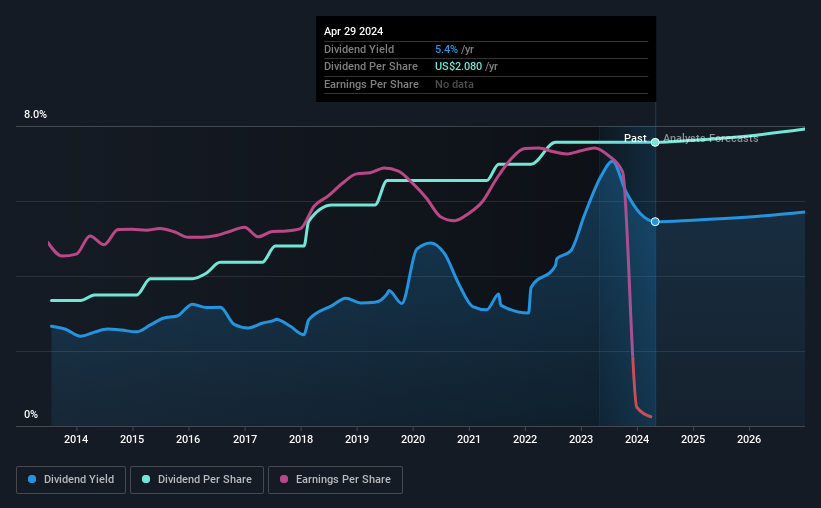
The board of Truist Financial Corporation (NYSE:TFC) has announced that it will pay a dividend of $0.52 per share on the 3rd of June. Based on this payment, the dividend yield on the company's stock will be 5.4%, which is an attractive boost to shareholder returns.
Check out our latest analysis for Truist Financial
Truist Financial's Payment Expected To Have Solid Earnings Coverage
Impressive dividend yields are good, but this doesn't matter much if the payments can't be sustained.
Truist Financial has established itself as a dividend paying company with over 10 years history of distributing earnings to shareholders. But while this history shows that the company was able to sustain its dividend for a decent period of time, its most recent earnings report shows that the company did not make enough earnings to cover its dividend payout. This is an alarming sign for the sustainability of its dividends, as it may mean that Truist Financialis pulling cash from elsewhere to keep its shareholders happy.
According to analysts, EPS should be several times higher in the next 3 years. Additionally, they estimate future payout ratio will be 53% over the same time horizon, which makes us pretty comfortable with the sustainability of the dividend.

Truist Financial Has A Solid Track Record
The company has an extended history of paying stable dividends. Since 2014, the dividend has gone from $0.92 total annually to $2.08. This works out to be a compound annual growth rate (CAGR) of approximately 8.5% a year over that time. Dividends have grown at a reasonable rate over this period, and without any major cuts in the payment over time, we think this is an attractive combination as it provides a nice boost to shareholder returns.
Dividend Growth Is Doubtful
Investors who have held shares in the company for the past few years will be happy with the dividend income they have received. Unfortunately things aren't as good as they seem. It's not great to see that Truist Financial's earnings per share has fallen at approximately 9.7% per year over the past five years. A modest decline in earnings isn't great, and it makes it quite unlikely that the dividend will grow in the future unless that trend can be reversed. However, the next year is actually looking up, with earnings set to rise. We would just wait until it becomes a pattern before getting too excited.
The Dividend Could Prove To Be Unreliable
In summary, while it's good to see that the dividend hasn't been cut, we are a bit cautious about Truist Financial's payments, as there could be some issues with sustaining them into the future. In the past the payments have been stable, but we think the company is paying out too much for this to continue for the long term. This company is not in the top tier of income providing stocks.
Investors generally tend to favour companies with a consistent, stable dividend policy as opposed to those operating an irregular one. Meanwhile, despite the importance of dividend payments, they are not the only factors our readers should know when assessing a company. For instance, we've picked out 1 warning sign for Truist Financial that investors should take into consideration. Looking for more high-yielding dividend ideas? Try our collection of strong dividend payers.
Valuation is complex, but we're here to simplify it.
Discover if Truist Financial might be undervalued or overvalued with our detailed analysis, featuring fair value estimates, potential risks, dividends, insider trades, and its financial condition.
Access Free AnalysisHave feedback on this article? Concerned about the content? Get in touch with us directly. Alternatively, email editorial-team (at) simplywallst.com.
This article by Simply Wall St is general in nature. We provide commentary based on historical data and analyst forecasts only using an unbiased methodology and our articles are not intended to be financial advice. It does not constitute a recommendation to buy or sell any stock, and does not take account of your objectives, or your financial situation. We aim to bring you long-term focused analysis driven by fundamental data. Note that our analysis may not factor in the latest price-sensitive company announcements or qualitative material. Simply Wall St has no position in any stocks mentioned.
About NYSE:TFC
Truist Financial
A financial services company, provides banking and trust services in the Southeastern and Mid-Atlantic United States.
Flawless balance sheet established dividend payer.
Similar Companies
Market Insights
Community Narratives



